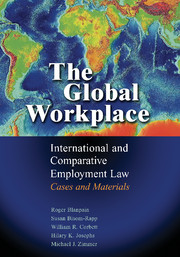Book contents
- Frontmatter
- Contents
- Acknowledgments
- Table of Cases
- Table of Statutes
- Table of Secondary Authorities
- 1 The Study of International and Comparative Employment Law
- 2 The International Labour Organization and International Labor Standards
- 3 The United States
- 4 Canada
- 5 Mexico
- 6 The Regulatory Approach of the North American Free Trade Agreement
- 7 The European Union
- 8 The United Kingdom
- 9 Germany
- 10 France
- 11 China
- 12 Japan
- 13 India
- 14 Pursuing International Labor Standards in U.S. Courts and Through Global Codes of Conduct
- Index
11 - China
Published online by Cambridge University Press: 05 June 2012
- Frontmatter
- Contents
- Acknowledgments
- Table of Cases
- Table of Statutes
- Table of Secondary Authorities
- 1 The Study of International and Comparative Employment Law
- 2 The International Labour Organization and International Labor Standards
- 3 The United States
- 4 Canada
- 5 Mexico
- 6 The Regulatory Approach of the North American Free Trade Agreement
- 7 The European Union
- 8 The United Kingdom
- 9 Germany
- 10 France
- 11 China
- 12 Japan
- 13 India
- 14 Pursuing International Labor Standards in U.S. Courts and Through Global Codes of Conduct
- Index
Summary
INTRODUCTION
Introduction to the Social and Historical Context
If sheer size, populousness, and continuity of influence are the measures of a superpower, China stands virtually unchallenged among the nations of the world. The actual age of a civilization self-identified as Chinese remains unknown and subject to reestimation with every stunning archaeological discovery, but if one were to apply retrospectively the definition of statehood under modern international law, China has been a “state” for more than two thousand years: it has had a defined territory (although ever expanding), a population (although ever growing), a government in control of the population and territory (which became ever more sophisticated in managing a large, densely inhabited space), and the capacity to engage in foreign relations with other states (the nomadic peoples of Inner Asia in ancient times, the global community today).
Given China's long history, in order to understand any aspect of contemporary Chinese law, it is important to recognize the persistence of tradition, in particular the influence of Confucianism. “Indeed, Confucianism is still an integral part of the ‘psycho-cultural construct’ of the contemporary Chinese intellectual as well as the Chinese peasant; it remains a defining characteristic of the Chinese mentality.” Tu Wei-ming, The Confucian Tradition in Paul S. Ropp., ed. Heritage of China: Contemporary Perspectives on Chinese Civilization 136 (1990). In the West, we tend to forget that, if one looks closely enough at so-called Western legal systems, the threads of tradition, from Greece to Rome to modern Europe and the Americas, are clearly present.
- Type
- Chapter
- Information
- The Global WorkplaceInternational and Comparative Employment Law - Cases and Materials, pp. 462 - 523Publisher: Cambridge University PressPrint publication year: 2007



